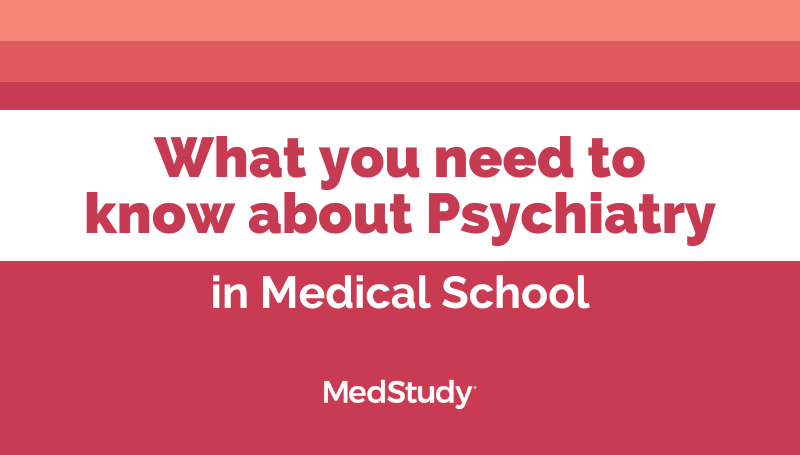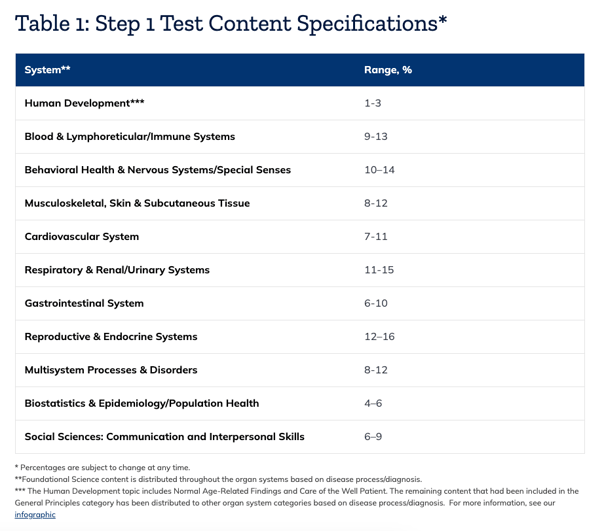Everything you need to know to study psychiatry in med school

Studying psychiatry can feel daunting due to the vast array of mental health disorders, their symptoms, and treatment options you need to memorize. Many resources simply list information without providing the clinical reasoning that helps make connections for long-term memorization and practical application.
If you’ve ever grappled with these concerns, you’re not alone. In this blog, we’re diving headfirst into how to study psychiatry, unraveling its complexities, and shedding light on the importance of understanding this subject.
What is psychiatry?
Psychiatry is the medical specialty that focuses on the mental, emotional, and behavioral wellbeing of patients. The common goal of clinicians is to help people attain and maintain a satisfactory quality of life. The many and varied disorders that physicians, especially psychiatrists, treat are defined in the Diagnostic and Statistical Manual of Mental Disorders (DSM).
What's the DSM?
The DSM is a classification system of psychiatric diagnoses. It's a comprehensive resource of diagnoses allowing health professionals to share a common language for symptoms, characteristics, and conditions of psychiatric disorders. It provides consistent information and guidance to enable professionals to understand and diagnose mental disorders. Clear and reliable diagnoses are vital because the diagnosis always guides the treatment—whether diagnosing individuals or entire populations.
What do you learn in psychiatry?
While studying psychiatry, a medical student will delve into a wide array of mental health disorders, gaining a comprehensive understanding of their diagnosis, symptoms, and treatment.
Cover every psychiatry subtopic you need to learn in med school
The MedStudy Medical Student Core Psychiatry book covers:
|
|
|
What do you need to know about psychiatry for USMLE exams?
To give you a sense of the scope of psychiatry and behavioral health, let’s look at the 2024 USMLE® outline for Behavioral Health.
- Psychotic disorders
- brief psychotic disorder; delusional disorder; psychotic disorder due to another medical condition;
schizophrenia; schizoaffective disorder; substance-induced psychotic disorder
- brief psychotic disorder; delusional disorder; psychotic disorder due to another medical condition;
- Anxiety disorders
- acute stress disorder; anxiety disorders (generalized anxiety disorder, anxiety due to another medical condition, social phobia); hyperventilation syndrome; obsessive-compulsive disorder; panic disorder with and without agoraphobia; phobic disorders; post-traumatic stress disorder; selective mutism; separation anxiety disorder; substance-induced anxiety disorder, trichotillomania
- Mood disorders
- major depressive disorder with and without psychotic features, with and without seasonal pattern; major depressive disorder, postpartum, with and without psychotic features, including screening; cyclothymic disorder; persistent depressive disorder (dysthymia); bipolar disorder, manic/depressed/mixed; premenstrual dysphoric disorder; bipolar and related disorder or depressive disorder due to another medical condition; substance/medication-induced bipolar and related disorder or depressive disorder (illegal or prescribed); suicidal ideation/attempt
- Somatic symptoms and related disorders
- body dysmorphic disorder; conversion disorder, including psychogenic seizures; dissociative disorders; illness anxiety disorder (hypochondriasis); malingering; pain disorder; somatic symptom disorder
- Factitious disorders
- factitious disorder imposed on self
- Eating disorders and impulse-control disorders
- anorexia nervosa; binge-eating disorder; bulimia nervosa; eating disorder; disruptive, impulse-control, and conduct disorders (eg, gambling, kleptomania, pyromania)
- Disorders originating in infancy/childhood
- reactive attachment disorder; attention-deficit/hyperactivity disorder; speech sound disorder or language disorder; learning disorder/dyslexia; intellectual developmental disorder and developmental delay, undefined, including school problems, fetal alcohol syndrome; oppositional defiant disorder, conduct disorder; autism spectrum disorder, Rett syndrome; psychoses with origin specific to childhood; elimination disorders (incontinence, encopresis); tic disorders/Tourette disorder
- Personality disorders
- antisocial personality disorder; avoidant personality disorder; borderline personality disorder; dependent personality disorder; histrionic personality disorder; narcissistic personality disorder; obsessive-compulsive personality disorder; paranoid personality disorder; schizoid personality disorder
- Psychosocial disorders/behaviors
- adjustment disorder; grief response/bereavement, normal and persistent complex; parent-child relational problems other than physical or emotional abuse; other psychosocial stress; psychodynamic and behavioral factors, related past experience (eg, transference, personality traits)
- Sexual disorders and gender dysphoria
- gender dysphoria; psychosexual dysfunction
- Substance use disorders
- alcohol use disorder/intoxication/dependence/withdrawal; tobacco/nicotine use disorder/dependence/withdrawal; varenicline use; cannabis use disorder/intoxication/dependence; hallucinogen use disorder/intoxication/dependence/withdrawal; inhalant use disorder/intoxication/dependence/withdrawal; opioid, heroin, including prescription drug, use disorder/intoxication/dependence/withdrawal; sedative, hypnotic, including benzodiazepine and barbiturate use disorder/intoxication/dependence/withdrawal; stimulant, cocaine, methamphetamine use disorder/intoxication/dependence/withdrawal; other drugs of use disorders (eg, ecstasy, PCP, bath salts)/intoxication/dependence/withdrawal; polysubstance use disorder/intoxication/dependence/withdrawal
What percentage of the Step 1 Exam is psychiatry?
While we’ll never know the exact number of Step 1 psychiatry questions that will pop-up on your exam, we can look to the content outline to discover the topics and their percentage weight. This way, you can focus your studies to coincide with the percentage weights of the topics.
According to the Step 1 Content Outline and Specifications from the USMLE®, under Step 1 Test Content Specifications, Behavioral Health & Nervous Systems/Special Senses has a range of 10-14%.

Step 1 Discipline Specifications as shown on the Step 1 Content Outline and Specifications from the USMLE®
What percentage of the Step 2 Exam is psychiatry?
According to the Step 2 CK Content Outline and Specifications from the USMLE®, under Step 2 CK Physician Tasks/Competencies Specifications, Behavioral Health has a range of 6-8%.
 Step 2 CK Physician Tasks/Competencies Specifications as shown on the Step 2 CK Content Outline and Specifications from the USMLE®
Step 2 CK Physician Tasks/Competencies Specifications as shown on the Step 2 CK Content Outline and Specifications from the USMLE®
Did you know?
MedStudy's Medical Student Core Psychiatry book is written by expert physician educators based on the USMLE Step 1 & 2 Content Outlines.
When you study with MedStudy resources, you know that what you're studying is already based on the weighted percentages of each topic.
Is psychiatry hard?
Psychiatry can be challenging due to the need to understand complex theories, diagnostic criteria, and treatment plans. Though it might feel overwhelming at times, with the right approach and study techniques, it becomes manageable and rewarding!
Why is psychiatry important?
For medical students, psychiatry is crucial because it forms the basis for how you will diagnose and treat mental health disorders in your future patients. Understanding psychiatry helps medical professionals provide comprehensive care, manage mental health crises, and improve patient outcomes.
How to study for psychiatry in med school
Studying psychiatry effectively requires a strategic approach and the right resources. Here are some tips to help you excel in this subject:
Find the right resources
For this part, using the Psychiatry Medical Student Core book and psychiatry questions from the the Step 1 & Step 2 Qbank+ is going to be essential. Let's break down why these are going to be your best resources to use.
Use this psychiatry textbook as a study aid
The Psychiatry Medical Student Core book breaks down only what you need to know for foundational knowledge in medical school and the USMLE® exams. You won't be bogged down by the extra fluff used in some psychiatry textbooks.
Get a comprehensive overview of psychiatry
Start with the Psychiatry Medical Student Core book for a broad overview of psychiatry and behavioral health to understand the basic concepts. This will help you contextualize detailed information as you progress through your studies. Utilize the book's many summary charts, diagrams, and figures to reinforce your understanding.
Try to get the basics down pat before moving on. This foundational knowledge will serve as your anchor as you delve deeper into the subject. Our psychiatry textbook “chunks” up the information by topic, and then by subtopic, to make it easier for you to learn and memorize.
Use psychiatry questions to study
To accompany your study of psychiatry from the Core book, you'll find the Step 1 & Step 2 Qbank+ essential for testing yourself on what you're learning. With 164 questions pertaining to psychiatry and behavioral health in our Step 1 Qbank+ and Step 2 Qbank+ you can self-test and pinpoint your knowledge gaps.
Use psychiatry patient cases to study
Why did you choose to study medicine? Most students would probably say to help people. The best way to keep your mind focused on your why is to imagine yourself in your role as a physician helping patients. And, the best way to do that is by answering Qbank+ questions.
Try it out with this Step 1 Qbank+ question. Imagine yourself in the exam room with this patient, how would you answer?
 We provided the full answer and explanation at the end of this blog
We provided the full answer and explanation at the end of this blog
Did you know?
When Qbank+ is purchased with digital Core, the content is interlinked. Meaning, you can easily move from questions in your Qbank+ to the same topic in the digital Core for deeper learning. And vice versa.
And, in the Medical Student Core, there are Clinical Pearls pulled out from the content and highlighted for you, so you can imagine yourself in patient scenarios like the one below. Clinical Pearls offer a unique way to visualize why what you’re learning in psychiatry will be important to your future patients!
Clinical Pearl from the Psychiatry Medical Student Core book
Psychiatry help for students
Studying psychiatry can be challenging, but you don’t have to go it alone. Resources like the Psychiatry Medical Student Core book and Qbank+ can be valuable aids in your journey. Use these tools to reinforce your learning through reading and practice quizzes.
As you embark on your psychiatry and behavioral health study journey, remember that it’s not just about acing exams—it’s about acquiring the knowledge that will enable you to make a difference in your patients' lives down the line.
Approach psychiatry with a strategic study plan and unwavering motivation, your dedication to mastering psychiatry and behavioral health will pay off as you become a skilled and knowledgeable physician! You’ve got this!
Here's the answer to the Step 1 Qbank+ psychiatry question above!
The United States Medical Licensing Examination (USMLE®) is a joint program of the Federation of State Medical Boards (FSMB®) and National Board of Medical Examiners (NBME®). None of the trademark holders are affiliated with MedStudy.




